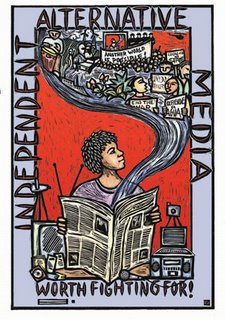How to get people do the dirty work without turning them into monsters?
 For years Slavoj Zizek has been faithful to the old maxim of cultural studies: watch a lot of television. But unlike most students of the art of cultural studies, Zizek gets good interpretations out of the tube. This time he's been watching the fifth season of the television drama '24' with the following outcomes reported in his Guardian column:
For years Slavoj Zizek has been faithful to the old maxim of cultural studies: watch a lot of television. But unlike most students of the art of cultural studies, Zizek gets good interpretations out of the tube. This time he's been watching the fifth season of the television drama '24' with the following outcomes reported in his Guardian column:"24 should not be seen as a simple popular depiction of the sort of problematic methods the US resorts to in its "war on terror". Much more is at stake. Recall the lesson of Apocalypse Now. The figure of Kurtz is not a remnant of some barbaric past. He was the perfect soldier but, through his over-identification with the military, he turned into the embodiment of the system's excess and threatened the system itself.
The problem for those in power is how to get people do the dirty work without turning them into monsters. This was Heinrich Himmler's dilemma. When confronted with the task of killing the Jews of Europe, the SS chief adopted the attitude of "somebody has to do the dirty job". In Hannah Arendt's book, Eichmann in Jerusalem, the philosopher describes how Nazi executioners endured the horrible acts they performed. Most were well aware that they were doing things that brought humiliation, suffering and death to their victims. The way out of this predicament was that, instead of saying "What horrible things I did to people!" they would say "What horrible things I had to watch in the pursuance of my duties, how heavily the task weighed upon my shoulders!" In this way, they were able to turn around the logic of resisting temptation: the temptation to be resisted was pity and sympathy in the presence of human suffering, the temptation not to murder, torture and humiliate.
There was a further "ethical problem" for Himmler: how to make sure that the executioners, while performing these terrible acts, remained human and dignified. His answer was Krishna's message to Arjuna in the Bhagavad-Gita (Himmler always had in his pocket a leather-bound edition): act with inner distance; do not get fully involved.
Therein also resides the lie of 24: that it is not only possible to retain human dignity in performing acts of terror, but that if an honest person performs such an act as a grave duty, it confers on him a tragic-ethical grandeur. The parallel between the agents' and the terrorists' behaviour serves this lie.
But what if such a distance is possible? What if people do commit terrible acts as part of their job while being loving husbands, good parents and close friends? As Arendt says, the fact that they are able to retain any normality while committing such acts is the ultimate confirmation of moral depravity.
So what about the response to this hair-splitting? Some argue that at least the US is now more open and less hypocritical about its behaviour towards terrorist suspects. To this, one should reply: "If US representatives mean only this, why are they telling us? Why don't they silently go on doing it, as they did it until now?" What is proper to human speech is the gap between the enunciated content and its act of enunciation. Imagine a couple who have a tacit agreement that they can have discreet extramarital affairs; if, all of a sudden, the husband openly tells his wife about an affair, she would have good reason to wonder why he was telling her. The act of publicly revealing something is never neutral; it affects the reported content itself.
The same goes for the US's recent admission that it is using torture. When we hear people such as Dick Cheney making statements about the necessity of torture, we should ask ourselves why he has decided to make a public statement about it. The question to be raised is: what is there in this statement that made the speaker decide to enunciate it? This is 24's real problem: not the content itself but the fact that we are being told openly about it. And that is a sad indication of a deep change in our ethical and political standards."



